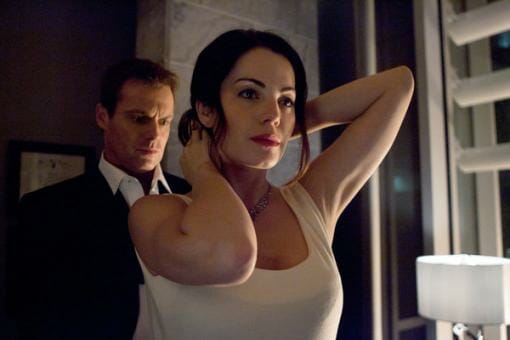By Becky Kifer · June 10, 2012

“What’s in a name?” some verbose guy you’ve probably never heard of once wrote. (Calm down, theater majors, I’m only joking.) The great Bard might not have understood the complexities of naming a television show, but he did understand the importance of words. A television show’s moniker is a gateway, a disclaimer of what you’re getting yourself into, be it 22 episodes or the two minutes it takes you to turn off a pilot. You know where you stand with a good television name.
It’s all about nouns, those persons, places, and things of the television world you’re about to enter: MacGyver, Rome, True Blood. Names ask existential questions like, Who’s the Boss?, or serve as an embarrassing reminder that as a teenager you actually watched a series called BeastMaster. Names tell us, in typically three words or less, what to expect.
Unless that name is Saving Hope, the Canadian show NBC has tapped to fill its summer programming void. I’ve not been this confused about a TV show title since Terriers, or Jeopardy!.
Saving Hope opens on a cab driving through the shiny streets of Toronto, with a man and woman in the backseat bantering about their pending wedding. We’ll shortly learn that Dr. Alex Reid (Erica Durance) is a surgeon and Dr. Charlie Harris (Michael Shanks) the Chief of Surgery at a local hospital, but before that: cue life-altering car crash in 3, 2, 1…
An SUV slams into the cab, and after the initial shock, the couple jumps from the vehicle to check on the cab driver and a woman in the SUV. After taking an absurdly long time to tell the woman he’s a doctor—I’m not sure how I’d react if after an accident some guy just started putting his face all up in my chest business—Charlie heroically re-inflates the woman’s lung with a plastic tampon cover before he collapses.
Bleeding into his brain, Charlie makes it to the hospital before slipping into a coma. But here’s the supernatural twist: although his body is unconscious, Charlie finds himself disembodied and wandering the hospital, unable to talk to anybody but the deceased. It’s Dead Like Me with the melodrama of Seattle Grace.
A few minor characters flutter about the peripherals: the new boyish hospital psychologist, the “cute” girlie doctor, the hotshot orthopedic surgeon with a Kiwi accent. There’s also the weekly rotating cast of patients. In this first episode a solider with PTSD punishes himself with unnecessary surgery, while an overweight teen with abdominable problems acts as the poster child for I Didn’t Know I Was Pregnant.
After an entire episode, I still don’t understand the title, even if I see the intent: Saving Hope has that schmaltzy Lifetime-mated-with-Hallmark vibe, and the main setting is in a hospital named Hope-Zion. But what TV has taught me recently is that you can raise Hope, because Hope is a baby, and you can save Grace, because Grace is a hard-drinking cop in need of a little heavenly intervention, but you can’t exactly take it upon yourself to “save” hope as a concept. (Also, is Toronto that depressing?)
Is the meaning about optimism then? Of keeping faith when things go terribly wrong? If the premise is to never give up hope and have your main character stuck between life and death in a hospital called Hope, why not name the show Haunting Hope? Will ghostly Charlie save the hospital in some fundamental way? Does he become an afterlife therapist? I can only express myself in caps when I ask: WHAT DOES IT ALL MEAN?!
Beats me.
But if you’ve had a craving for soft-lighted paranormal medical shows with enough lens flare action to make even J.J. Abrams cringe, you’ve found your new obsession. Canadian summer shows don’t always have the greatest track record on NBC—The Listener, anyone?—and unfortunately Saving Hope comes off more generic than twisty genre mashup. Anyone looking for a sexy medical drama will probably find Saving Hope a little too nice for its own good (even the “bad boy” played by The Vampire Diaries’ Daniel Gillies is still a pretty OK guy), while the supernatural side of the story is about as tame as a bedtime story. Saving Hope makes The Ghost Whisperer look edgy.
The two leads, Durance and Shanks, have pleasant if not necessarily sexual chemistry. Durance’s Lois Lane was a spunky addition to Smallville—when the writers weren’t making her go undercover as a stripper—and I’m curious to see her go dramatic. Shanks is a little tepid, but he’s engaging when he’s playing storyteller and narrating to the audience. (Confession: I have trouble disengaging Shanks from his 10-year run on Stargate SG-1. His Daniel Jackson is, to this day, still my favorite fictional character of all time. I’m working on it.)
It’s not gripping, but Saving Hope is more safe than terrible. The trick for the show will be to find something compelling for Charlie to do besides a moping Casper routine. Maybe we’ll finally discover the mysteries of life, the universe, and everything as we all stare into the lens flares that cut through every scene like a portal to the Great Beyond. Will one mystery include the show’s title? Alas, I fear that what’s in a name probably doesn’t matter much—that which we call Saving Hope by any other name would still feel as soapy.